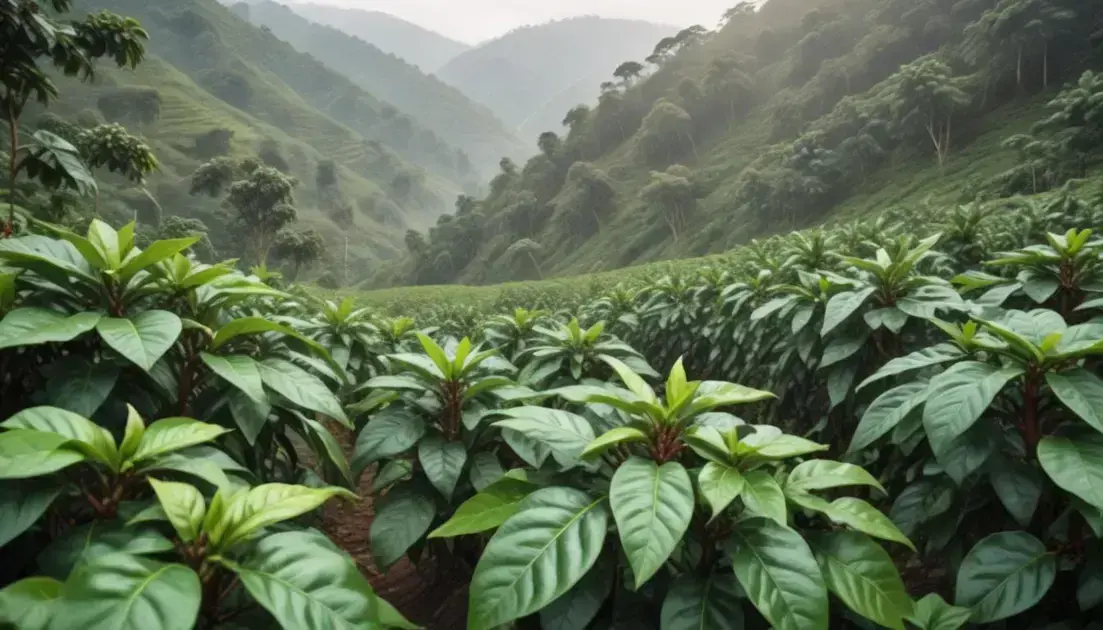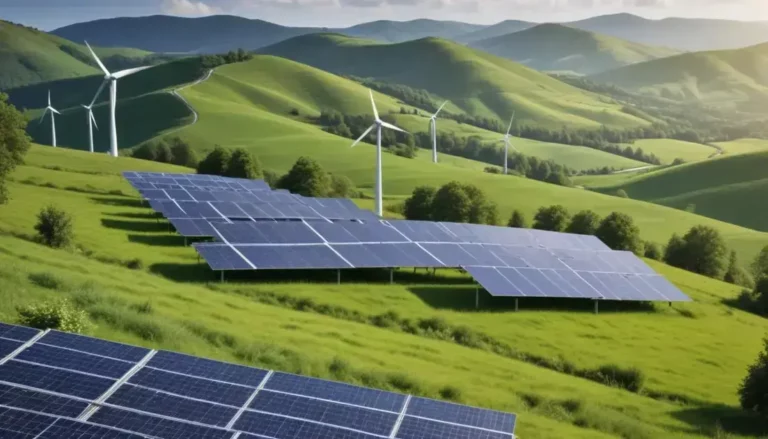The Effects of Climate Change on Coffee Production
Sustainable coffee production involves practices that enhance biodiversity, promote regenerative agriculture, and achieve carbon neutrality, ensuring long-term viability while protecting the environment and supporting farmers’ livelihoods.
Have you considered how *climate change* significantly influences coffee production? Understanding its effects can transform how we grow and enjoy this beloved beverage. Let’s explore the implications together!
Impact of climate change on coffee yields
The impact of climate change on coffee yields is increasingly evident. Rising temperatures and unpredictable rainfall patterns challenge traditional coffee farming practices. As the climate warms, coffee plants may struggle to produce, leading to lower yields and decreased quality.
Moreover, various pests and diseases thrive in warmer conditions, putting additional stress on coffee crops. Farmers need to adapt by implementing resilient growing techniques and exploring sustainable practices such as shade-grown coffee, which can help mitigate some adverse effects.
Shifts in climate zones mean that areas once ideal for coffee cultivation may no longer be suitable. This reality forces farmers to reconsider their planting locations and explore new regions that may offer better conditions. However, transitioning to these new areas poses its own set of challenges, including soil health management and resistance to environmental changes.
In response to these challenges, coffee producers increasingly seek diversification of crops to bolster resilience against climate impacts. This strategy not only supports ecosystem health but also provides farmers with varied income sources. Understanding these dynamics is crucial for ensuring the future of coffee production in a warming world.
Challenges for coffee farmers
The challenges for coffee farmers are growing as climate change continues to disrupt traditional farming practices. One of the most pressing issues is the increased incidence of extreme weather events. Droughts and heavy rains not only damage crops but also affect the delicate balance of the ecosystem that coffee depends on.
Additionally, pest infestations are becoming more severe. Warmer temperatures create favorable conditions for pests such as the coffee borer beetle. This pest not only reduces crop yields but can also compromise the quality of the beans, affecting market prices.
Another significant challenge is the fluctuating market prices for coffee. Farmers often find it difficult to maintain a consistent income due to these price swings. This instability can hinder their ability to invest in sustainable farming practices or to prepare for unforeseen challenges.
Moreover, many coffee farmers lack access to current research and technology that could help them adapt to these changing conditions. This gap in knowledge prevents them from employing effective solutions to combat climate-related challenges. Collaboration with agricultural experts and government support can provide valuable resources and information, helping farmers better navigate the complexities of today’s coffee production landscape.
Sustainable practices in coffee production
Sustainable practices in coffee production are essential for addressing the challenges posed by climate change. These methods promote environmental health while ensuring that farmers can maintain their livelihoods. One key approach is shade-grown coffee, which allows coffee plants to thrive under the protection of trees. This technique enhances biodiversity and reduces the need for chemical fertilizers and pesticides.
Another important practice is organic farming, which eliminates synthetic chemicals in favor of natural alternatives. Organic coffee cultivation not only benefits the environment but also often results in higher market prices, appealing to consumers seeking sustainably sourced products. Farmers can also improve soil health through crop rotation and using cover crops, enhancing the fertility of the land.
Water management is another critical aspect of sustainable coffee farming. Implementing systems for efficient irrigation reduces water waste and helps maintain the essential moisture level for coffee plants. Farmers can also invest in rainwater harvesting techniques to make the most of seasonal rains.
Lastly, educating farmers about these practices is crucial. By sharing knowledge and providing access to resources, communities can collectively improve their coffee production methods. Embracing sustainability not only safeguards the future of coffee but also fosters an equitable and resilient coffee industry.
The role of regenerative agriculture
The role of regenerative agriculture in coffee production is critical for building a sustainable future. This farming approach emphasizes restoring and enhancing the health of ecosystems and soil, which is essential for the long-term viability of coffee crops. Unlike conventional practices that often deplete soil nutrients, regenerative agriculture focuses on soil health by using techniques such as cover cropping, composting, and reduced tillage, which maintain soil structure and fertility.
Integrating biodiversity into coffee farming is another core aspect of regenerative agriculture. By diversifying crops and incorporating tree cover, farmers create a more resilient ecosystem. This increased biodiversity helps control pests naturally and reduces reliance on harmful chemicals. It also enhances the overall health of the farm landscape.
Moreover, regenerative practices contribute to climate change mitigation. Healthy soils sequester carbon, thus playing a vital role in reducing greenhouse gas emissions. Farmers adopting these methods can improve their coffee’s resilience to changing climate conditions, securing yields even in adverse weather.
Collaboration among producers, researchers, and policymakers is essential to promote regenerative agriculture. By sharing knowledge and resources, the coffee industry can transition towards practices that not only ensure profitability but also protect the environment for future generations.
Future of coffee sustainability
The future of coffee sustainability hinges on innovative practices and a collective commitment to environmental stewardship. As climate change accelerates, the coffee industry must adapt by embracing sustainable farming techniques that protect ecosystems and ensure viable coffee production. Emerging technologies like precision agriculture are set to play a vital role. These tools enable farmers to use resources more efficiently, reducing waste and minimizing environmental impact.
One promising trend is the integration of regenerative practices. By restoring soil health and promoting biodiversity, farmers can enhance the resilience of their crops in the face of climate challenges. This shift not only supports coffee quality but also contributes to greater ecosystem stability.
Consumer demand for sustainably sourced coffee is also increasing. Brands that commit to ethical sourcing practices not only foster trust but also build a loyal customer base. Certification programs that verify sustainability practices can help buyers make informed choices while encouraging producers to invest in more responsible methods.
Furthermore, collaboration among stakeholders—farmers, businesses, researchers, and consumers—is essential for driving change. By working together, the coffee community can foster an industry that prioritizes sustainability, ensuring that future generations can enjoy this beloved beverage without compromising the planet.
Biodiversity in coffee cultivation
Biodiversity in coffee cultivation plays a crucial role in promoting sustainable agricultural practices. By maintaining a diverse ecosystem within coffee farms, farmers can enhance both the quality and quantity of their coffee yields. Planting a mix of shade trees, cover crops, and other complementary species can improve soil health and reduce the need for chemical fertilizers.
Increased biodiversity helps support beneficial organisms such as pollinators and natural pest predators. This balance allows for a healthier coffee ecosystem, minimizing reliance on harmful pesticides and herbicides. Additionally, diverse plant varieties can provide resilience against pests and diseases, which are becoming more prevalent due to climate change.
Moreover, incorporating native plant species into coffee cultivation can enhance local ecosystems. These plants offer habitats for wildlife and help preserve local flora and fauna, contributing to greater ecological balance in the area. More diverse cultivation systems are also better equipped to adapt to changing climate conditions, ensuring a more stable coffee supply.
Promoting biodiversity in coffee farms not only benefits the environment but also improves the livelihoods of farmers. Consumers are increasingly seeking sustainably grown coffee, making biodiversity a valuable asset in the marketplace. By prioritizing biodiversity, the coffee industry can secure its future while supporting a healthy planet.
Paths to carbon neutrality
Paths to carbon neutrality in coffee production are becoming increasingly crucial as the industry grapples with climate change. Achieving carbon neutrality involves reducing greenhouse gas emissions and implementing practices that restore natural ecosystems. One effective strategy is the adoption of sustainable farming techniques that optimize resource use and minimize waste. These methods include precision agriculture and crop rotation, which help reduce fertilizer and pesticide reliance.
Another essential aspect is reforestation. By planting trees alongside coffee crops, farmers can create shade that not only improves coffee quality but also enhances carbon sequestration. This practice helps absorb carbon dioxide from the atmosphere, contributing to lower overall emissions.
Investment in renewable energy sources, such as solar or wind power, is also key. Coffee processing can be energy-intensive, and utilizing renewable energy reduces reliance on fossil fuels, further minimizing carbon footprints. Additionally, utilizing biomass from coffee waste for energy can provide a sustainable fuel source.
Collaboration between farmers, businesses, and consumers is vital for driving initiatives toward carbon neutrality. Educating consumers about the importance of sustainably sourced coffee can encourage ethical purchasing decisions, which, in turn, supports farmers committed to environmentally friendly practices. Together, these efforts can significantly contribute to a greener coffee industry.
Embracing a Sustainable Future for Coffee
In conclusion, the journey towards sustainability in coffee production is vital for the future of the industry. By focusing on practices that enhance biodiversity, promote carbon neutrality, and leverage innovative farming techniques, coffee farmers can protect their crops and the environment.
As consumers, we have the power to support sustainable coffee choices. By choosing responsibly sourced coffee, we encourage farmers to adopt eco-friendly methods that benefit both the planet and local communities.
Collaboration among farmers, businesses, and consumers is essential for creating a sustainable coffee industry. Together, we can ensure that coffee remains a beloved beverage for generations to come, while safeguarding our planet.
Let’s all play a part in supporting a thriving coffee culture that values sustainability and respects nature.
Frequently Asked Questions
What are the main challenges faced by coffee farmers?
Coffee farmers face challenges such as climate change, pest infestations, fluctuating market prices, and limited access to resources and technology.
How does biodiversity impact coffee production?
Biodiversity enhances ecosystem health, supports beneficial organisms, and increases resilience against pests and diseases, ultimately improving coffee quality and yields.
What role does regenerative agriculture play in coffee sustainability?
Regenerative agriculture focuses on restoring soil health, improving biodiversity, and promoting sustainable practices that enhance the resilience of coffee crops against climate impacts.
How can consumers support sustainable coffee?
Consumers can support sustainable coffee by choosing products that are certified as ethically sourced and by engaging with brands that prioritize sustainable practices.
What strategies can the coffee industry adopt to achieve carbon neutrality?
The coffee industry can adopt strategies like reforestation, using renewable energy, implementing sustainable farming techniques, and optimizing resource use to reduce carbon footprints.
Why is collaboration important in promoting coffee sustainability?
Collaboration brings together farmers, businesses, researchers, and consumers to share knowledge and resources, driving initiatives that enhance sustainability in the coffee industry.






